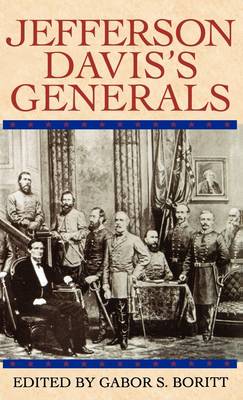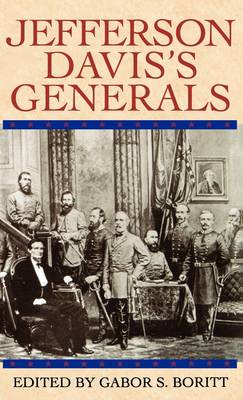
- Afhalen na 1 uur in een winkel met voorraad
- Gratis thuislevering in België vanaf € 30
- Ruim aanbod met 7 miljoen producten
- Afhalen na 1 uur in een winkel met voorraad
- Gratis thuislevering in België vanaf € 30
- Ruim aanbod met 7 miljoen producten
Omschrijving
In Jefferson Davis's Generals, a team of the nation's most distinguished Civil War historians present fascinating examinations of Jefferson Davis's relationships with five key generals who held independent commands: Joseph E. Johnston, Robert E. Lee, P.G.T. Beauregard, Braxton Bragg, and John Bell Hood. Craig Symonds examines the underlying implications of a withering trust between Johnston and his friend Jefferson Davis. And was there really harmony between Davis and Robert E. Lee? A tenuous harmony at best, according to Emory Thomas. Michael Parrish explores how Beauregard and Davis worked through a deep and mutual loathing, while Steven E. Woodworth and Herman Hattaway make contrasting evaluations of the competence of GeneraLs Braxton Bragg and John Bell Hood. Taking a different angle on Davis's ill-fated commanders, Lesley Gordon probes the private side of war through the roles of the generals' wives, and Harold Holzer investigates public perceptions of the Confederate Leadership through printed images created by artists of the day. Pulitzer Prize-winner James M. McPherson's final chapter ties the individual essays together and offers a new perspective on Confederate strategy as a whole.
Jefferson Davis's Generals provides stimulating new insights into one of the most vociferously debated topics in Civil War history.
Specificaties
Betrokkenen
- Auteur(s):
- Uitgeverij:
Inhoud
- Aantal bladzijden:
- 256
- Taal:
- Engels
- Reeks:
Eigenschappen
- Productcode (EAN):
- 9780195120622
- Verschijningsdatum:
- 29/07/1999
- Uitvoering:
- Hardcover
- Formaat:
- Genaaid
- Afmetingen:
- 147 mm x 227 mm
- Gewicht:
- 512 g

Alleen bij Standaard Boekhandel
Beoordelingen
We publiceren alleen reviews die voldoen aan de voorwaarden voor reviews. Bekijk onze voorwaarden voor reviews.







